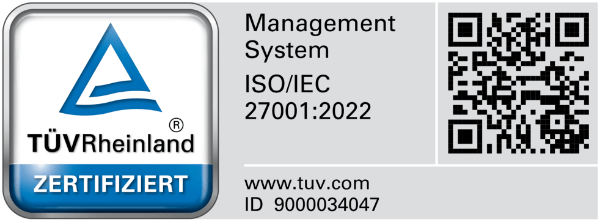In an increasingly connected and data-driven world, companies face the challenge of managing large volumes of data, diverse channels, and high customer expectations efficiently. CRM systems like Salesforce offer far more than just technical support – they become strategic platforms for sustainable growth and customer centricity.
Better Customer Experiences as a Growth Driver
Modern CRM platforms such as Salesforce not only allow centralized customer data collection but also intelligent analysis and usage. Marketing and sales benefit from a unified 360-degree view of the customer. The result: personalized communication, faster response times, and measurable efficiency gains.
As a Software as a Service (SaaS) platform, Salesforce also enables relatively easy implementation, low initial costs, and an intuitive user interface. Even employees without deep digital expertise can quickly become productive.
More Than Just a CRM System: Salesforce as an Enabler of Digital Transformation
Salesforce is not just a tool for marketing and sales. Through the integration of advanced automation features, AI-driven analytics, and open interfaces, it becomes the central hub for company-wide processes. When used effectively, it not only optimizes customer interactions but also significantly improves internal collaboration.
The platform scales with your needs and can be tailored to business units and industry specifics – from simple CRM contact management to complex, AI-supported forecasts and workflows.
An integrated system landscape is also a prerequisite for the successful use of AI in a business context. Only when data from various departments is centralized and of high quality can intelligent systems support sound decisions and efficiently automate processes.
Salesforce Integration Is a Leadership Responsibility
While modern integration solutions often make technical implementation relatively straightforward, strategic preparation ultimately determines the success of the project. Leaders must see integration not as a mere IT project, but as a company-wide transformation.
Key questions in advance: What strategic goals is the company pursuing? Which data sources are critical to success? And how can the new platform help address existing weaknesses?
Addressing Common Integration Challenges Early On
To unlock the full potential of a Salesforce integration, it's essential to identify and address common obstacles early – underestimated hurdles often lead to wasted time, increased costs, and reduced user acceptance.
Data Quality: Without reliable, consistent data, no CRM project can succeed. Multiple source systems, duplicate or outdated data, and a lack of standards complicate integration. Early data cleansing is essential.
Silo Thinking: Salesforce achieves its full potential when data and processes are interconnected across systems. Outdated interfaces and fragmented IT landscapes often stand in the way of progress.
Resources & Time: Many companies underestimate the effort involved. Realistic planning, clear responsibilities, and sufficient budget buffers are necessary to avoid unexpected costs and project delays.
Success Factors for Salesforce Integration
Salesforce integration is most successful when executive leadership is actively involved and the project is treated as part of the broader digital strategy.
Strategic Alignment:
CRM must support central business goals – such as revenue growth, customer retention, or process efficiency. These goals should be regularly reviewed and adjusted as needed.
Iterative Approach:
Instead of a risky “big bang,” a phased rollout with pilot phases is recommended. This enables early feedback, faster adjustments, and encourages user acceptance.
Change Management:
A system is only as good as its adoption. Internal training, transparent communication, and clear points of contact help reduce skepticism and boost motivation.
Team & Partners:
Project responsibilities must be clearly defined. External partners with Salesforce expertise can provide valuable insights – it’s crucial that all parties share a common goal and that leadership buy-in is visible.
Leverage Scalability:
Salesforce allows for gradual expansion – after a successful launch, features and user access can be extended as needed. KPIs such as lead turnaround time or conversion rates help demonstrate the value.
Salesforce Integration: Recommendations for Management
Executive leadership plays a key role in the long-term success of a Salesforce integration. The following strategic focus areas are especially critical:
Anchor CRM in corporate strategy:
Ensure your CRM initiative supports key business goals like growth, efficiency, or customer loyalty.Actively manage data quality and change:
Invest in clean data and foster a culture that embraces change – through communication, training, and defined responsibilities.
Start small, scale with purpose:
Begin with a well-defined pilot project and expand the solution gradually to other teams and processes.
Make success measurable:
Use business-relevant KPIs like lead times, conversion rates, or customer feedback to transparently track progress.
Stay involved – even after go-live:
Remain visibly engaged in the project, support implementation actively, and ensure the integration stays on track.
Conclusion: Use Salesforce Strategically for Long-Term Business Success
A Salesforce integration is much more than a technical implementation – it marks the beginning of a deep organizational transformation. Those who approach it strategically not only improve efficiency and customer focus but also lay the foundation for long-term agility and growth.
Through continuous enhancement – including AI capabilities, industry-specific extensions, and new integration options – Salesforce becomes a cornerstone of modern business strategy. Those who recognize and harness this potential early promote not only technical excellence but also organizational resilience and innovation.
Are you planning a Salesforce integration or looking to optimize your existing processes?
Reach out to us – we’ll support you at every step. Together, we’ll develop a solution tailored to your goals and organizational structure.


